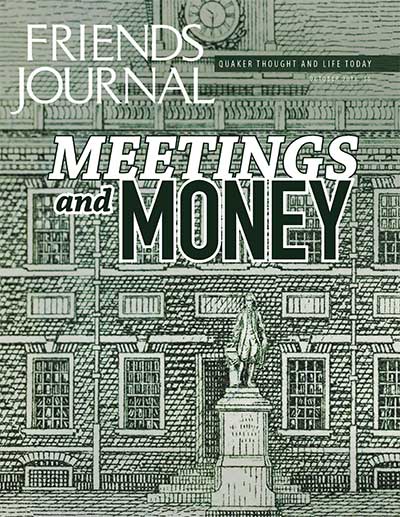
Imagine this scenario:
It’s a typical Sunday afternoon, and the clerk reminds Friends that meeting for worship with attention to business is starting in the other room in five minutes. People slowly enter the room, taking their seats. The room gets quieter as the sounds of conversation die down and the sounds of shuffling bags and papers seem to grow louder. After a few minutes, the clerk welcomes everyone and reviews the agenda for the meeting, which is approved. The first item is next year’s budget. The treasurer reports that contributions from members continue to decline, and expenses continue to rise. The draft budget shows a deficit. The treasurer suggests that members could contribute more to cover the deficit; otherwise, the meeting will have to reduce its expenses. Tensions rise and the energy in the room shifts as people become visibly agitated.
One Friend notes that she cannot possibly contribute more, as she is on a fixed income and has trouble paying her bills. A Friend suggests that the meeting should reduce the amount it gives to the school, as the meeting has few children and the school is doing just fine. A Friend vehemently objects to that idea, as the school is under the care of the meeting and Quaker schools are the best form of outreach we have. “What about the amount we pay to the yearly meeting? Certainly that could be reduced,” a Friend suggests. “Absolutely not!” is the view of someone else. “The yearly meeting needs our funds for children’s programs. If it weren’t for those programs, my children would have no Quaker friends!” “Well clearly,” another Friend notes, “we could just eliminate the money we spend on coffee and snacks and stop with the monthly food cupboard. We don’t have enough volunteers anyway. We could eliminate childcare during worship, and stop helping people attend conferences. The budget problem would be solved.”
Does that scenario sound familiar? Money and resources are topics today that create significant amounts of anxiety and animosity in many Friends meetings. As meetings lose members and resources shrink, tensions can run high, and difficult choices need to be made. This is true for monthly, quarterly, and yearly meetings as well as Quaker schools and organizations. How can decisions and choices be made from a spiritual perspective instead of an anxious one?
Three Types of Financial Transactions
There are three types of financial transactions: between individuals, between individuals and institutions, and between institutions.
Some examples of financial transactions between people are shopping at yard sales, babysitting, borrowing money from a friend, mowing lawns, or hiring someone to make a repair. Transactions between individuals rarely happen in Quaker meetings, but I can think of one particular instance. I was attending a Quaker meeting in a large city, and a person experiencing homelessness would often come to meeting asking people for money. Sometimes, when I saw him across the room, I noticed myself feeling anxious. I would make a speedy exit or try to avoid him. I didn’t like that he asked me for money, and I didn’t want to give him any.
Financial transactions between people and an institution involve things like buying a cup of coffee, withdrawing funds from the bank, paying the rent or mortgage, buying groceries, or shopping online. At a Quaker meeting, they can be things like making an individual donation to the meeting, getting reimbursed from the meeting for expenses incurred on behalf of programs or events, receiving funds to help children attend Quaker schools, or the financial support provided to ministers of the meeting. These transactions represent a relationship between a person and an institution; like any other relationship, they can have a positive or negative influence on our lives.
Examples of financial transactions between institutions are a meeting paying its electric or phone bills, remitting funds to yearly meeting, donating to a school, or receiving investment income. These transactions represent a relationship between groups of people, and reflect who we are as groups.
It’s important to understand these types of transactions because as we talk about meetings and money, we are predominantly talking about the latter two, but when we are talking about our meeting members’ personal finances, we are talking about the first two types of financial transactions.
Mutual Blessing
Most friends are familiar with George Fox’s phrase “answering that of God in every one” from a 1656 letter to Friends in the ministry written from Launceston jail. Many claim it as the core Quaker belief. We have a testimony on equality precisely because there is that of God in everyone. We have a testimony on peace because to act violently toward another would be to act violently toward that of God in others. One could argue that recognizing God in others and oneself is a core tenet of Quaker faith. But Fox’s quote does not actually end there.
And this is the word of the Lord God to you all, and a charge to you all in the presence of the living God, be patterns, be examples in all countries, places, islands, nations, wherever you come; that your carriage and life may preach among all sorts of people, and to them. Then you will come to walk cheerfully over the world, answering that of God in every one; whereby in them you may be a blessing, and make the witness of God in them to bless you. Then to the Lord God you will be a sweet savour and a blessing. (The Journal of George Fox, edited by John L. Nickalls, 1985)
Fox is advocating using our lives as examples to engage with others, recognizing God in them, where we can be a blessing to them, and God, from within others, can bless us in return. This is the concept of mutual blessing. Mutual blessing is a kind of relationship—a spiritual relationship—which by definition is reciprocal.
In my spiritual life, I have found God to live in relationship. I can sit alone at home in prayer and have a spiritual experience, but there is something different about meeting for worship with other people that enhances my personal experience. I believe that a mutually reciprocal relationship, which blesses each party in a relationship, is a spiritual practice based upon that of God in everyone.
What would the world be like if we used our financial relationships as opportunities for mutual, reciprocal blessings from God? How would our conversations around money shift, if we based them on this premise? How can anxiety and animosity be transformed to mutual blessing?
Anxiety and Greed to Milk and Honey
In the February 2009 issue of Sojourners magazine, Walter Brueggemann describes a spiritual shift around money and finances from one of anxiety and greed to one of milk and honey. In this shift, he identified three areas: from autonomy to covenantal existence, from anxiety to the abundance of God, and from greed to generosity.
| Anxiety and Greed | –> | Milk and Honey | |
| autonomy | –> | covenantal existence | |
| anxiety | –> | abundance of God | |
| greed | –> | generosity |
From autonomy to covenantal existence: When one operates from the autonomous perspective, there is a sense of isolation and the desire to be a self-sufficient person. Such a person seeks to be completely autonomous, owes no one anything, is accountable to no one, and can rely only on themselves. Conversely, when one operates from a covenantal existence perspective, a person exists within a community, and the community supports all of its members as a collective whole. When a particular person has financial struggles, perhaps the community can collectively discover additional shared resources–-whether monetary or otherwise–-that can help the individual and the community.
From anxiety to abundance of God: The autonomous person never has enough to feel safe and secure. As a result, the autonomous person produces bottomless anxiety about having enough and being enough. Conversely, moving away from autonomy and anxiousness can lead us to the abundance of God in faith and among community. God shows up in community to provide when there are no visible means of support. It is God who provides manna from heaven that feeds the people (Exodus 16:4–17). We see that same God of abundance when Jesus feeds thousands with five loaves of bread and two fish and still has baskets of leftovers (Mark 6:30–44). Perhaps if our focus shifts from a sense of lack as individuals to a sense of abundance in God as faith communities, resources will materialize from unexpected sources.
From greed to generosity: From the perspective of an autonomous person with anxiety, having enough today does not necessarily mean enough tomorrow. To have enough tomorrow, for oneself and one’s family, means storing resources for the future. Greed comes from the need to store resources into the future in order to have enough for the long term. Conversely, from the perspective of God’s abundance, greed is replaced with generosity. When viewed from a covenantal perspective based in God’s abundance, others are seen to be siblings in a community that collectively share for the well-being of everyone.
A Shift to Milk and Honey
Perhaps a viewpoint of mutual blessing would change the greedy perspective of me-and-mine in isolation, to a reciprocal relationship of us-and-ours in community. I know that it did for me. After reading and studying Brueggemann’s article, I started to think about the man experiencing homelessness. What if I chose to shift my perspective from anxiety and greed to milk and honey?
So, I experimented. Before I went to meeting, I put a few dollars in my pocket for him. When I saw him at the end of worship, I walked over to him and gave him a big hug, plus the money in my pocket. I learned his name, and that his mother died when he was very young, and that his birthday is in July. I learned he is just a few months younger than me. As I got to know him over time, we became friendlier. I learned of his problems and concerns. Others in the meeting got to know him as well. A cake was purchased to celebrate his birthday the following July, and he became part of the community. The anxiousness which caused me to avoid him and want to hold onto my own money shifted to a sense of generosity with which I deliberately engaged with him. As I was generous with my time, attention, and dollars as well as a smile, a hug, and a listening ear, he blessed me in return by sharing his love of life, his faith in God, and prayers for me and my family. Money that I avoided sharing in my sense of anxiety and greed had become a mutual, reciprocal blessing as I shared in a spirit of milk and honey and generosity.
A Different Scenario
Imagine a different scenario from the opening one, where the same meeting was reviewing the budget for next year. Only this time, they embrace the concept of money as mutual blessing and choose to operate from a place of milk and honey instead of anxiety and greed. Perhaps it would look something like this:
The budget is the first item on the agenda. The Finance Committee clerk and the treasurer jointly present the prior year’s actual figures and the current year’s actual figures, then lead the meeting in an exercise of sharing our gifts of time, talent, and treasure for the upcoming year.
During the exercise, the meeting reflects, asking itself:
How are our relationships with each other, with other organizations, with the broader Quaker community, and with our local community? What gifts do we have to share? What gifts do others have to share with us? What part of our community is operating out of anxiety or greed? Where do we experience milk and honey? How have we been blessed with abundance? Where do we notice a sense of lack? How do we invest in our community? How do we invest in each other?
One Friend notes that she doesn’t have much money to give but she wants to support the meeting, and wonders in what ways she can contribute.
A Friend thinks about the meeting’s relationship with the school, and notes that it does not feel like the meeting and the school are connected. This Friend sees that, instead of operating in isolation, there are ways the school and the meeting can be in better relationship, share resources, and support each other. One Friend notes that, in speaking of relationships, the meeting’s relationship with the yearly meeting could also be better. It seems very one-sided at the moment, with the meeting remitting its covenant annually but without knowing why? The next Friend explains how important the yearly meeting is to his children, as they really enjoy the programs the yearly meeting has to offer. Another Friend notes that caring for ourselves and each other is vitally important, whether that be at coffee hour, through childcare, or the work the meeting does in the wider community contributing volunteers and resources to the food cupboard.
After additional discussion, the meeting approved next year’s budget to be the same as the current year’s budget, agreeing to review it quarterly. Two Friends were charged with initiating discussions with the school. Two other Friends agreed to initiate discussions with the yearly meeting. A Friend who could not financially contribute agreed to coordinate the meeting’s involvement with the food cupboard. There was also an overall understanding that the budget is a spiritual document that reflects the health of our relationships between each other and the greater community.
Mutual Blessing in Financial Relationships
As in Fox’s letter, when we see that of God in others, there is an opportunity for mutual blessing in reciprocal relationships. It is this idea that can become the basis of our financial dealings in faith communities, shifting the focus of monetary issues from anxiety and greed to milk and honey, from fear and animosity in isolation to generosity and blessing in community. In this way, we can learn to develop a common spiritual language around money, and use it to cultivate mutual blessing in the world. Further, we can also be stewards of God’s abundance and invest God’s gifts as faithful servants, spreading mutual blessings in our financial dealings, as we walk cheerfully over the world answering that of God in everyone.





What a wonderful article, Lola – thank you! And what great inspiration; I hope it is of use to many Meetings. Perhaps the only thing to add is that George Fox’s words were grounded in the biblical ones: “…will he [God] not much more clothe you, oh you of little faith? So do not worry, saying, ‘what shall we eat?’ or ‘what shall we drink?’ or ‘what shall we wear?’ … [for] your heavenly father knows that you need them. But seek first his kingdom, and all these things will be given to you as well.” Matthew 6:30-33 When you overcame yourself, Lola, and reached out to the homeless man, you were effectively seeking first God’s kingdom, and indeed, much good came of your gesture. This is a profound lesson.
Surely the same principles can be applied to all our money issues. Trusting that God knows what is needed in any given situation, it is for us to seek and discern, as best we can, what God’s wishes might be, and – having done on a practical level what we can, with the desire to put our resources to the most ‘kingdomly’ use – then to leave the rest in God’s hands. I learned to do this with my material means, and since have never had any anxiety nor any material need.
Philadelphia, PA
Lola, thanks so much for this helpful perspective. I concur that taking the time to become better acquainted with those around you begets mutual confidence in each relationship. That confidence is the foundation on which a meeting, or any other successful organization can flourish.
Just as one’s own skills and talents, money is a gift from God, to be nurtured and utilized well while were on this earth. And in the end you can’t take it with you! At times, nurturing and utilizing money with purpose requires us to take or assume risk. The mutual confidence developed though better acquaintance with those in organizations that we care about is what provides each of us with the ability to assume risk, whether as an individual or as a part of that group.